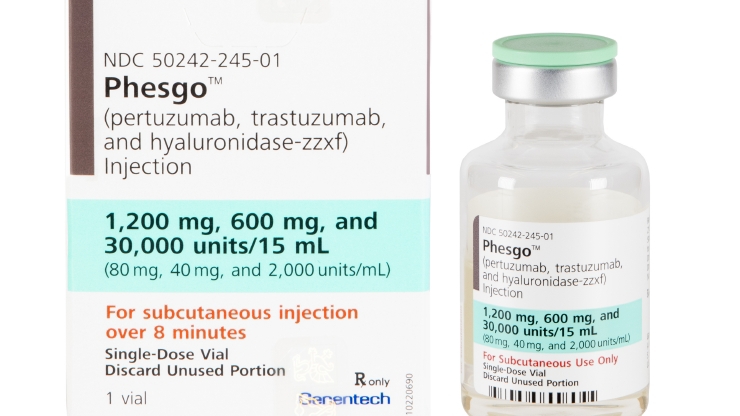Xeloda () vs Phesgo (pertuzumab, trastuzumab, and hyaluronidase)
Xeloda () vs Phesgo (pertuzumab, trastuzumab, and hyaluronidase)
Xeloda (capecitabine) is an oral chemotherapy medication that is commonly used to treat breast and colorectal cancers by interfering with the DNA synthesis of cancer cells, causing them to die. Phesgo, on the other hand, is a subcutaneous injection combining two monoclonal antibodies, pertuzumab and trastuzumab, with hyaluronidase, and is specifically indicated for the treatment of HER2-positive breast cancer by targeting the HER2 protein on cancer cells. The choice between Xeloda and Phesgo would largely depend on the specific type of cancer a patient has, its molecular characteristics such as HER2 status, and the overall treatment plan determined by the healthcare provider.
Difference between Xeloda and Phesgo
| Metric | Xeloda () | Phesgo (pertuzumab, trastuzumab, and hyaluronidase) |
|---|---|---|
| Generic name | Capecitabine | Pertuzumab, Trastuzumab, and Hyaluronidase-zzxf |
| Indications | Colorectal cancer, metastatic breast cancer | HER2-positive breast cancer |
| Mechanism of action | Thymidine phosphorylase activation, interfering with DNA synthesis | HER2 receptor inhibition, preventing cell growth and proliferation |
| Brand names | Xeloda | Phesgo |
| Administrative route | Oral | Subcutaneous injection |
| Side effects | Hand-foot syndrome, diarrhea, nausea | Infusion-related reactions, alopecia, fatigue |
| Contraindications | Dihydropyrimidine dehydrogenase (DPD) deficiency | History of severe allergic reactions to active substances |
| Drug class | Antimetabolite, fluoropyrimidine | Monoclonal antibodies, enzyme inhibitor |
| Manufacturer | Roche | Roche |
Efficacy
Xeloda (Capecitabine) in Breast Cancer Treatment
Xeloda, also known by its generic name capecitabine, is an oral chemotherapy medication that is used to treat breast cancer. It is a prodrug that is converted into 5-fluorouracil (5-FU) in the body, which is a cytotoxic agent that interferes with DNA synthesis and hinders the growth of cancer cells. Xeloda is particularly effective in the treatment of metastatic breast cancer, especially after the failure of standard chemotherapy regimens. Clinical trials have demonstrated that Xeloda is effective in prolonging progression-free survival and overall survival in some patients with metastatic breast cancer. Additionally, it has been used in combination with other drugs to enhance its efficacy.
Phesgo (Pertuzumab, Trastuzumab, and Hyaluronidase) in Breast Cancer Treatment
Phesgo is a combination of two monoclonal antibodies, pertuzumab and trastuzumab, with hyaluronidase, an enzyme that helps increase the absorption of the drugs. This combination is used for the treatment of HER2-positive breast cancer, which is a subtype of breast cancer characterized by the overexpression of the HER2 protein. Pertuzumab and trastuzumab work synergistically to inhibit the signaling pathways that promote the growth and survival of HER2-positive cancer cells. Phesgo has been shown to be effective when used in combination with chemotherapy as a first-line treatment for metastatic breast cancer and as an adjuvant treatment for early HER2-positive breast cancer.
Comparative Efficacy in Clinical Settings
The efficacy of Xeloda and Phesgo in treating breast cancer varies based on the cancer's characteristics and the stage at which treatment is initiated. Xeloda's effectiveness is generally considered in the context of metastatic disease, often as a subsequent line of therapy. In contrast, Phesgo's efficacy has been established in both the metastatic setting and as an adjuvant therapy, providing a significant benefit in terms of disease-free survival and overall survival. The combination of pertuzumab and trastuzumab in Phesgo targets the HER2-positive breast cancer specifically, making it a targeted therapy with a distinct mechanism of action compared to Xeloda's broader cytotoxic effects.
Conclusion on Efficacy
Both Xeloda and Phesgo have demonstrated efficacy in the treatment of breast cancer, albeit in different settings and patient populations. Xeloda is a valuable option for patients with metastatic breast cancer, particularly when other treatments have failed. Phesgo, on the other hand, has expanded treatment options for patients with HER2-positive breast cancer, offering a convenient subcutaneous administration and the potential for improved outcomes when used early in the treatment regimen. The choice between these medications depends on the specific characteristics of the breast cancer and the overall treatment plan designed by healthcare professionals.
Regulatory Agency Approvals
Xeloda
-
European Medical Agency (EMA), European Union

-
Food and Drug Administration (FDA), USA

Phesgo
-
European Medical Agency (EMA), European Union

-
Food and Drug Administration (FDA), USA

Access Xeloda or Phesgo today
If Xeloda or Phesgo are not approved or available in your country (e.g. due to supply issues), you can access them via Everyone.org.
How it works

Make an enquiry
Choose the medicine you want to buy, answer a couple of questions, and upload your prescription to speed things up. We’ll get back to you within 24 hours.


Make an enquiry
Choose the medicine you want to buy, answer a couple of questions, and upload your prescription to speed things up. We’ll get back to you within 24 hours.


Breeze through the paperwork
We'll guide you through the required documents for importing unapproved medicine, ensuring you have all the necessary information.


Get a personalized quote
We’ll prepare a quote for you, including medicine costs and any shipping, administrative, or import fees that may apply.


Receive your medicine
Accept the quote and we’ll handle the rest - sourcing and safely delivering your medicine.

Some text on this page has been automatically generated. Speak to your physician before you start a new treatment or medication.
Let's talk
If you have any questions, call us or send us a message through WhatsApp or email:
Contact us




